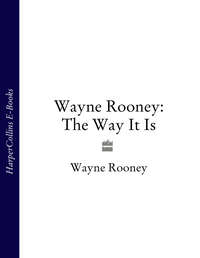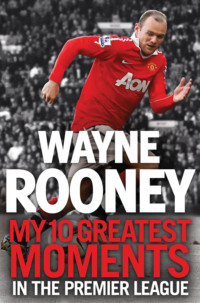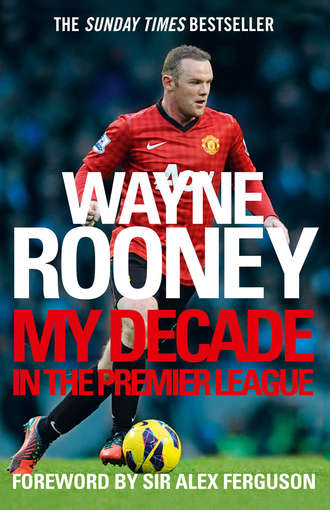
Полная версия
Wayne Rooney: My Decade in the Premier League
When I was a lad, I thought I’d be able to play football forever. These days, I know it’s not going to last, but the funny thing is I’m not too worried about the end of my career, the day I have to jack it all in. If I’m ever at a stage where I feel I’m not performing as well as I used to, then I’ll take an honest look at myself. I’ll work out whether I’m still able to make a difference in matches at the highest level. I’m not going to hang around to snatch the odd game here and there in the Premier League. I’ll play abroad somewhere, maybe America. I’d love to have a go at coaching if the opportunity comes up.
The thing is, I want to be remembered for playing well in football’s best teams, like United. I want to burn out brightly on the pitch at Old Trafford, not fade away on the subs’ bench.
*****
Hanging up my footy boots is a way off yet. There’s more stuff to be won. I want more league titles, more Champions Leagues – anything United are playing for, I want to win it. I’m into winning titles for the team because winning personal achievements, while being nice, isn’t the same as winning trophies with my teammates. And whatever I do, I do it to be the best that I can. I’m not good at being an also-ran, as anyone who has played with me will know.
For 10 years, it’s been all or nothing for me in the Premier League.
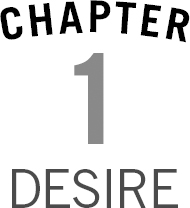
Ten years in the Premier League. All the goals and trophies, injuries and bookings driven by one thought: I hate losing. I hate it with a passion. It’s the worst feeling ever and not even a goal or three in a match can make a defeat seem OK. Unless I’ve walked off the pitch a winner, the goals are pointless. If United lose, I’m not interested in how many I’ve scored.
I’m so bad that I even hate the thought of losing. Thinking about defeat annoys me, it does my head in, it’s not an option for me, but when it does happen, I lose it. I get angry, I see red, I shout at teammates, I throw things and I sulk. I hate the fact that I act this way, but I can’t help it. I was a bad loser as a lad playing games with my brothers and mates, and I’m a bad loser now, playing for United.
It doesn’t matter where I’m playing, or who I’m playing against either, I’m the same every time I put on my footy boots. In a practice match at Carrington before the last game of the 2009/10 season, I remember being hacked down in the area twice. I remember it because it annoys me so much. The ref, one of our fitness coaches, doesn’t give me a decision all game and my team loses by a couple of goals. When the final whistle blows and the rest of the lads walk back to the dressing room to get changed, laughing and joking together, I storm off in a mood, kicking training cones and slamming doors.
It’s the same when I’m competing off the pitch. I often play computer games with the England lads when I’m away on international duty. One time I lose a game of FIFA and throw a control pad across the room afterwards because I’m so annoyed with myself. Another night I lean forward and turn the machine off in the middle of a game because I know I’m going to lose. Everyone stares at me like I’m a head case.
‘Come on, Wazza, don’t be like that.’
That annoys me even more, so I boot everyone out of the room and sulk on my own.
It’s not just my teammates I lose it with. I have barneys with people as far away as Thailand and Japan when I play them at a football game online. They beat me; I argue with them on the headset that links the players through an internet connection. I’m a grown man. Maybe I should relax a bit more, but I find it hard to cool down when things aren’t going my way, and besides, everyone’s like that in my family. We’re dead competitive. Board games, tennis in the street, whatever it was that we played when I was a lad, we played to win. And none of us liked losing.
I sometimes think it’s a good thing – I don’t reckon I’d be the same as a footballer if I was happy to settle for second best. I need this desire to push me on when I’m playing, like Eric Cantona and Roy Keane did when they were at United. They had proper passion. I do too, it gives me an edge, it pushes me on to try harder. Those two couldn’t stand to lose. They didn’t exactly make many pals on the pitch either, but they won a lot of trophies. I’m the same. I doubt many players would say they’ve enjoyed competing with me in the past and I like to think that I’m a pain in the backside for everyone I play against. I’m probably a pain in the backside for people I play with as well, because when United lose or look like losing a game at half-time, I go mad in the dressing room.
I scream and shout.
I boot a ball across the room.
I throw my boots down.
I lose it with teammates.
I yell at people and they yell at me.
I’m not shouting and screaming and kicking footballs across the room because I don’t like someone. I’m doing it because I respect them and I want them to play better.
I can’t stand us being beaten.
I yell at players, they yell at me. I don’t take it personally when I’m getting a rollicking and I don’t expect people to take it personally when I dish it out to them. It’s all part of the game. Yeah, it feels like a curse sometimes, the anger and moodiness when I lose, but it’s an energy. It makes me the player that I am.
*****
My hatred of losing, of being second best, starts in Croxteth. My family are proud; Crocky is a proud place and nobody wants to let themselves down or their family down in the street where I live. My family haven’t got a lot, but we have enough to get through and my brothers and I aren’t allowed to take anything for granted as we’re growing up. We know that if we want something, we have to graft for it and I’m told that rewards shouldn’t come easily. I pick that up from my mum, my dad, my nan and my granddad. I learn that if I work hard, I’ll earn rewards. If I try at school, I’ll get the latest Everton shirt – the team my whole family supports – or a new footy if I need one. It’s where the will to work comes from.
This discipline, the desire to win and push myself, also happens away from school. I box at the Crocky Sports Centre with my Uncle Richie, a big bloke with a flat boxer’s nose. He hits pretty hard. I never actually scrap properly but I spar three times a week and the training gives me strength and an even harder competitive streak. Most of all it brings out my self belief.
I think we’re all confident in the family, but I don’t think it’s just the Rooneys. I reckon it’s a Liverpool thing. Everyone’s really outgoing in Crocky; everyone speaks their mind, which I like. As a kid, I learn to take that self-belief into the boxing gym. If ever I get into the ring with a lad twice my size I never think, Look at the size of him! I’m going to get battered. Doing that means I’m beat in my head already. Instead, I go into every fight thinking, I’m going to win, even against the bigger lads. One pal at the gym is called John Donnelly1, he’s older and heavier than me, but every time we spar together, Uncle Richie tells me to take it easy on him. He’s frightened John can’t handle me.
The desire to win and the self-belief on the footy pitch is there from the start too, even when I play for De La Salle, my school team. If ever a player knocks me off the ball in a tackle I work on my strength training in the gym the following week. I promise myself that it won’t happen again. No-one’s going to beat me in a scrap for the ball.
If I look like losing my hunger, Dad pushes me a bit. When I play football on a Sunday afternoon, he always comes to watch. He encourages me to get stuck in. He gets more wound up than me sometimes. He tells me to work harder, to try more. I play one match and it’s freezing, my hands are burning and my feet are like blocks of ice. I run over to the touchline.
‘Here, Dad, I’m going to have to come off. It’s too cold. I can’t feel my feet.’
His face turns a funny colour and he looks like he’s going to blow up with anger.
‘What? You’re cold?’
He can’t believe it.
‘Get out there and run more. Get on with it.’
I leg it around a bit harder to warm myself up. I’m only nine but I know that if Dad’s advice is anything to go by, I’ll have to toughen up even more if I want to be a proper footballer.
*****
All my heroes are battlers.
On the telly, I love watching boxers, especially Mike Tyson because his speed and aggression makes him so exciting. He always goes for the KO. When I watch Everton with Dad, my favourite player is Duncan Ferguson because he’s a fighter like Iron Mike, hard as nails, and I love the way he never gives up, especially if things aren’t going his way. He always gets stuck in. He also scores cracking goals. I could watch him play all day.
I love Everton, I’m mad for them. I write to the club and ask to become the mascot for a game when I’m 10 years old. A few weeks later a letter comes through the door telling me I’ve been chosen and I’m dead chuffed because I’m going to be walking out with the team for the Merseyside derby at Anfield. I step onto the pitch with our skipper, Dave Watson, and Liverpool’s John Barnes and I can’t believe the noise of the crowd. Later I go into the penalty area to take shots at our keeper, Neville Southall. I’m only supposed to be passing the ball back to him gently, but I get bored and chip one over his head and into the back of the net. I can see that he’s not happy, so when he rolls the ball back to me, I chip him again.
I just want to score goals.
A couple of years later, I get to be a ball boy at Goodison Park. Neville’s in goal again and as I run to get a shot that has gone out of play he starts shouting at me. ‘Effin’ hurry up, ball boy!’ he yells. It scares the crap out of me. Afterwards, I go on about it for ages to my mates at school.
That afternoon at Anfield, Gary Speed scores for us, which I’m dead chuffed about because he’s one of my favourite players. I can see that he works hard and he’s a model pro. Someone tells me that he grew up as an Evertonian as well, so when my mum buys me a pet rabbit a little while later, I decide to name him ‘Speedo’. Two days afterwards, the real Speedo signs for Newcastle and I’m moody for days.
*****
The training and the toughening up pays off.
I get spotted by club scouts when I’m nine years old and join Everton, which is like a dream come true. Then I play in the older teams at the club rather than my own age group because I’m technically better and physically stronger than the lads in my year. It’s mad; I don’t let on to the kids my age when I go to footy practice because I never play with them, I don’t really know them. When I’m 14 years old, I work with the Everton Under-19s. Me, a kid, playing against (nearly) grown blokes and competing, scoring goals, winning tackles. It feels great.
It gets better. At 15, I play in the Everton reserves. At 16, I’m in the first team. I know I can play at this level because I’m grafting hard and a place in the side is my reward, just like Mum and Dad taught me. Some of the coaches wonder whether I’ve got enough strength to mix it with the pros, but I know I have bags of it because boxing with Uncle Richie has given me the muscle.
When we play Manchester United’s reserves at our place, one of our coaches gives us instructions to be strong with Gary Neville, one of the stars of their first team. Everyone hates Gary Nev outside of Old Trafford because he’s United through and through. He’s always giving it on the pitch.
Not long into the game we both go up for a header. I accidentally catch him with my elbow and when I turn round to see if it’s had any effect on him, he doesn’t even flinch. The next time we go for a ball, he gets me back, clattering into me really hard.
It’s just another lesson in playing the game.
*****
I don’t change for 10 years. I take that same Crocky spirit onto the pitch throughout my career. Rolling up my sleeves, gritting my teeth and getting on with things helps me to a lot of goals at Manchester United. Like when I’m playing against Arsenal in January 2010. We’re one-up through an own goal from their keeper, Manuel Almunia. Arsenal are one of our rivals for the Premier League and beating them will go some way to helping us win the title. I know that if we score again we’ll probably take the game. Luckily, I manage to get us a second goal in the 37th minute, a strike that comes from not giving up.
I’m back defending, doing the dirty work, getting stuck in deep in the United half, which some strikers won’t do. I win the ball on the edge of our penalty area, lay it off to Nani and leg it, checking the position of the Arsenal defence as I push on towards them. I can see their full-back, Gael Clichy, on one side of me, but I’m focused on Nani. He’s bombing down the wing and I know a pass is coming my way if I can bust a gut to get into the right spot. He plays the ball into my path, I check my stride and thump a shot past Almunia first time which puts the result beyond Arsenal.
Three points in the bag.
When fans talk about the players with a desire to win games, they always mention the tacklers, the ball-winning midfielders, but desire to me is something different. It’s my goal against Arsenal; it’s sprinting for several seconds (again and again) to get onto a pass that might not come. Desire is playing out wide and making runs into the box and then tracking back to defend. Desire is risking injury to score. Desire is about trying your heart out and never giving up.
When the player stats came out for the Arsenal game – which they do for the Premier League every week – United’s fitness coach, Tony Strudwick, comes into the dressing room at training with all the facts and figures. He reads out the speed of my run during the build up to our second goal. Apparently, I covered 60 metres in a ridiculous time.
‘If you’d carried on running for another 40 metres at that pace, you’d have done the 100 metres in 9.4 seconds,’ he says, looking at the flipchart with a smile on his face.
Everyone starts cracking up. That stat makes me quicker than Usain Bolt.
*****
Sometimes I go too far. The same blanked-out feeling that happens whenever I score takes over when the red mist comes down.
During an away game against Fulham in March 2009, nothing seems to go right for United and I lose it, big time. We’ve been beaten by Liverpool the week before and The Manager wants us to bounce back at Craven Cottage. Instead, we go a goal down after a penalty is given against Scholesy, who gets sent off for deliberately handling the ball in our box. I come on during the second half in place of Berbatov and pick up a booking.
I’m getting fouled all the time. With a minute left, the ball comes to me and somebody hacks at my ankles again, but the ref gives the decision to the other lot. I’m furious. I pick up the ball, meaning to luzz it to Jonny Evans, but I misjudge it and the ball flies hard past the ref.
He thinks I’ve thrown it at him.
Oh no, here we go.
Out comes the second yellow card, then the red. Game over.
I can only think of one thing.
This is going to cost us the league.
Two defeats on the bounce; a suspension for the next match. I’m livid. The red mist comes on. As I walk off the pitch, the crowd start to jeer. Everything boils up inside me, my head’s banging. Sometimes in those situations, I get so angry that I never know what I’m going to do next. Thankfully, nobody gets in my way. The first thing that crosses my path is the corner flag. I lamp it. When I get to the dressing room, I punch the wall and nearly break my hand.
Paul Scholes is already sitting there, staring at me, just watching, as if it’s only natural for me to stick a right hook onto a concrete wall. He’s had time to shower and change. He’s looking smart in his official club suit.
‘You as well?’
I nod. My hand is killing me, I worry I might have busted it.
Nice one, Wayne.
Neither of us says a word. I sit there in my kit, fuming. Then a flash of fear comes into my head.
Oh god, The Manager’s going to kill me.
I hear the final roar from the crowd as the whistle goes. We’ve lost, 2–0. I hear the players’ studs clicking on the concrete path that leads to the dressing room. The door opens, but nobody talks as they sit down.
Silence.
Nobody looks at me. Giggsy, Jonny Evans, Rio, Edwin van der Sar, all of them stare at the floor. Then The Manager comes in and goes mad.
‘You were poor as a team!’ he screams. ‘We didn’t perform!’
He points at me, furious, red in the face, chewing gum.
‘And you need to calm down. Relax!’
The Manager’s right: I should relax, but he knows as well as me that the thought of losing is what drives me on in football, in everything, because he’s built the same way.
We both hate to be second best.
*****
Look, I’m not always happy about it.
After the Fulham game, I worry that people have an opinion on what sort of person I am because of what they see on the football pitch. They see me punching corner flags and shouting on the telly and must think that I’m like that in everyday life. They watch me going in hard in the tackle and probably assume that I’m some kind of thug. Sometimes, when people see me pushing my son Kai around the supermarket with Coleen, they stare at me with their jaws open, like I should be in my kit, shinpads and boots, arguing with the bloke collecting the trollies, or kicking down a stack of toilet rolls in a massive strop.
These are much cheaper down the road!
I’m not like that though.
When I first meet people I’m quiet and shy. I don’t open up that easily. I definitely don’t react badly in conversation and I don’t talk to friends and family in the same way as I talk to defenders and teammates. I don’t tell them to ‘eff off’ if things don’t go my way. I don’t turn the computer off if I’m watching my pals play. Losing it only happens when I’m competing. And only if I lose. It’s not something I’m proud of, but it’s something I’ve had to live with. I obviously have two very different mindsets: one that drives me on in the thick of a game and another I live my life by. The two never cross over.
1John Donnelly, if you’re wondering, is now a professional boxer, a super flyweight. I spent a lot of time thinking about becoming a pro fighter too, but in the end I went for football.
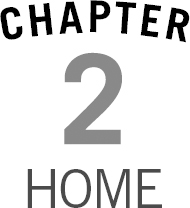
Matches are won and lost in the tunnel at Old Trafford, but the one thing I notice when I stand there for the first time as a United player is that it seems to go on for miles and miles. It’s long and dark. The ceilings are low and the players bump into one another as they walk to the pitch, almost shoulder to shoulder, because it’s so narrow and cramped. At the end, over the heads of players, officials and the TV cameramen, past the red canopy that stretches out onto the pitch, I can see the bright green blur of the grass, the floodlights and the crowd and some United fans hanging over the edge of the wall, shouting and waving flags.
It’s September 2004, United against Fenerbahçe. I’m about to make my first-team debut in the Champions League, a competition I’ve always dreamt of playing in.
The noise is mad, a buzz of 67,128 people, like a loud hum. When I first played here against United for Everton that buzz weighed me down a bit. It felt claustrophobic, it felt like a cup final. It did my head in. Now it pumps me up, but I can see why some players might feel trapped in here. Standing in the Old Trafford tunnel is like being in a box. If a footballer hasn’t been here before and they’re lined up next to the United players for the first time, it’s a terrifying moment. The weight of expectation is huge. A player has to be able to handle it if they’re going to be able to play well in front of the crowd here.
The Manager knows all about the importance of this place. The atmosphere is such a big deal that he even makes it his business to find out which players from the opposition have faced us here before and which ones haven’t. He tells us before a game; he knows who’s frightened and he wants us to know, too. Sometimes, as we get ready he lists names from the other lot, the lads playing here for the first time – they’re the ones who might not be on their game.
Later in the season I see it for myself. In some teams, the newly promoted ones usually, the players look scared as they start their walk to the pitch. Others look as if they’re starting their big day out for the season, or even their career. I can tell that they want to make the most of it, that they want to soak up the occasion. They clock their families in the stands and smile and wave like it’s their biggest ever achievement. As they make the slow walk from the tunnel in the corner of the ground to the halfway line they’re thinking one thing: Bloody hell, this is Old Trafford. Good news for us: the distraction can stop them from thieving a point. Bad news for them: they’re 1–0 down psychologically.
Now I’m about to make my first walk from the tunnel in a United shirt.
Today it’s all about my signing, my first game. I’ve been at the club nearly two months, but I haven’t played a minute of first team football after I busted a bone in my foot at Euro 2004, which has been annoying for everyone because I cost the club a lot of money. Still, the fans have been sound. I see them on the box and they’re saying how excited they are to see me here, but the one worry at the back of my mind is that it might take a while for them to accept me because I’m a Scouser. I might have to do something really special to win them over.
They’re on my side tonight, though. The crowd are singing my name before I even get onto the pitch.
‘Rooney!’
‘Rooney!’
‘Roooooooo-neeeeee!’
The shivers run down my spine as I walk into the glare of the floodlights for the first time in a red shirt. I’m bricking it.
It makes me laugh whenever I watch the tape of that game now: I come out of the tunnel with a chewy in my mouth and my eyes don’t seem to move as I walk across the grass. I don’t even blink. I stare straight ahead, trying to focus. The camera catches me puffing my chest out, getting myself ready, staring at the sky above the massive stand in front of me. I don’t look at anything in particular, just a space above that huge wall of people which seems to stretch up forever, full of red and black and white and some yellow and green.
I want to soak up the noise.
I don’t want to turn round.
I don’t want to see how massive everything looks.
Bloody hell, this is Old Trafford.
*****
Everything had been so quiet and calm before.
I sat in the dressing room ahead of the game and watched as everybody prepared themselves. I saw some of the biggest names in the league getting ready: winger Ryan Giggs stretching his skinny frame, Gary Neville bouncing on the spot; Dutch striker Ruud van Nistelrooy and Rio Ferdinand playing two touch with a ball, their passes pinging off the concrete floor. It was totally different to the atmosphere at Everton.
At Goodison it was rowdy and loud, people shouted, yelled, issued instructions. It dawned on me that some teams have to win games through team spirit; they have to fight harder for one another. Pumping up the dressing room builds a strong attitude. It helps to psyche out the opposition. Before the Fenerbahçe game I noticed that everyone in a United shirt prepared in their own way – calmly, quietly. No one screamed or shouted. They knew that if we played well we’d win the game no problem. There was no need to scream and shout.
I felt like I’d come to the right place.


